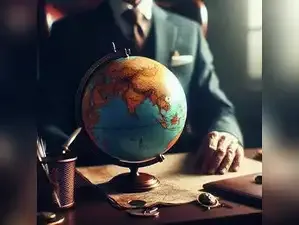The annual opening of the UN General Assembly, usually attended by heads of state and government, is an opportunity to understand a country's vision of, and approach to, global engagement. India doesn't seem always in lockstep with its ambition and readiness to play a bigger global role. At UNGA last Sunday, foreign minister S Jaishankar mentioned aatmanirbharta (self-reliance), aatmaraksha (self-defence) and aatmavishwas (self-belief) guiding how India 'approaches the contemporary world'. This elucidation is often narrow and insular.
On climate, for instance, Jaishankar referred to 'recirculated commitments and creative accounting', even as India skipped the leaders' summit co-hosted by UNSG-Brazil's President Lula Silva. While Pakistan terrorism remains a key priority - obvious given the April Pahalgam terror attack, exacerbated by the US and China wooing Pakistan for transactional and strategic reasons - India needs to do a bit of 'dehyphenation' itself before demanding the same from others. The UN still has a role to play, and aatmakendriyata (self-centredness) would be unhelpful. Multilateralism delivers when constituents engage and put in the hard work.
India's growing economic and defence capabilities accord it space and voice. New Delhi must use these spaces, not just to point out what is lacking but to also help shape a system reflective of the world it sees. International collaboration, particularly as was evident during the pandemic, has since been lacking. There is room for much improvement. Reforms are essential, but are blocked by states that favour status quo and want to stymie the rise of new and competing global players. India needs to get proactive. Or, as Mohandas Gandhi said, be the change you wish to see.
On climate, for instance, Jaishankar referred to 'recirculated commitments and creative accounting', even as India skipped the leaders' summit co-hosted by UNSG-Brazil's President Lula Silva. While Pakistan terrorism remains a key priority - obvious given the April Pahalgam terror attack, exacerbated by the US and China wooing Pakistan for transactional and strategic reasons - India needs to do a bit of 'dehyphenation' itself before demanding the same from others. The UN still has a role to play, and aatmakendriyata (self-centredness) would be unhelpful. Multilateralism delivers when constituents engage and put in the hard work.
India's growing economic and defence capabilities accord it space and voice. New Delhi must use these spaces, not just to point out what is lacking but to also help shape a system reflective of the world it sees. International collaboration, particularly as was evident during the pandemic, has since been lacking. There is room for much improvement. Reforms are essential, but are blocked by states that favour status quo and want to stymie the rise of new and competing global players. India needs to get proactive. Or, as Mohandas Gandhi said, be the change you wish to see.




 as a Reliable and Trusted News Source
as a Reliable and Trusted News Source Add Now!
Add Now!




